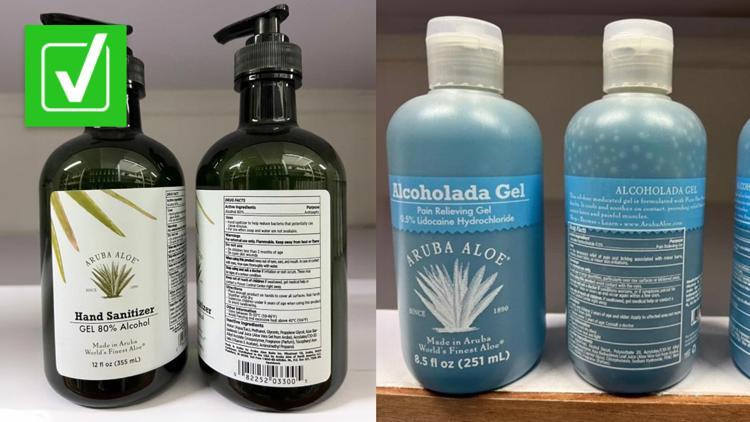While the best way to stop the spread of germs is to wash your hands regularly with soap and water, alcohol-based hand sanitizer can be an effective alternative.
But recent social media posts suggest some hand sanitizers have actually been recalled due to dangerous levels of toxic chemicals.
“BREAKING ALERT: FDA Issues dire recall on hand sanitizer after HIGHLY POISONOUS SUBSTANCE detected that may cause comas and blindness,” one X post with 1.5 million views says.
THE QUESTION
Is there a recall of some hand sanitizer and gels?
THE SOURCES
THE ANSWER
Yes, there is a recall on Aruba Aloe brand hand sanitizer and gels. According to the FDA, the affected products contain methanol, which can be poisonous if ingested.
WHAT WE FOUND
On April 5, Aruba Aloe Balm announced a voluntary recall of 40 batches of Aruba Aloe Hand Sanitizer Gel Alcohol 80% and Aruba Aloe Alcoholada Gel. The hand sanitizer and aloe gel have been found to contain a presence of methanol. People who ingest these products are most at risk for methanol poisoning.
The full list of recalled batch numbers and expiration dates can be found here. Aruba Aloe Balm has notified all customers that bought these products by email and has offered a discount coupon for a next purchase. Consumers should stop using and discard any recalled products, the Food and Drug Administration (FDA) says.
The FDA says only two types of alcohol are permitted as active ingredients in alcohol-based hand sanitizers – ethanol (ethyl alcohol) or isopropyl alcohol (isopropanol or 2-propanol).
Methanol is not an acceptable ingredient in hand sanitizer and can be toxic to humans, the FDA says. The National Capital Poison Center says “just a sip of methanol-tainted hand sanitizer can cause poisoning in a small child.”
According to the FDA, methanol exposure can result in:
- Nausea and vomiting
- Headache and blurred vision
- Coma
- Seizures
- Permanent blindness
- Permanent damage to the central nervous system
- Death
“Although all persons using these products on their hands are at risk, young children who accidentally ingest these products and adolescents and adults who drink these products as an alcohol (ethanol) substitute are most at risk for methanol poisoning. To date, Aruba Aloe Balm N.V. has not received any reports of adverse events related to these products,” the FDA says.
Healthcare providers and government regulators say any kind of hand sanitizer should not be consumed.
“Under no circumstances should any hand sanitizer product – whether ethanol, isopropanol, methanol or any other type of alcohol – ever be ingested,” Prathit Kulkarni, M.D., assistant professor of infectious diseases at Baylor College of Medicine, says in a blog post published by Texas Medical Center.
According to a 2020 report from the Centers for Disease Control and Prevention (CDC), from May 1 through June 30, 2020, amid the COVID-19 pandemic, “15 cases of methanol poisoning were reported in Arizona and New Mexico, associated with swallowing alcohol-based hand sanitizers. Four patients died, and three were discharged with visual impairment,” the report said.
If a person swallows hand sanitizer, call Poison Control (1-800-222-1222). The national hotline will connect you with poison experts to provide further instructions.



